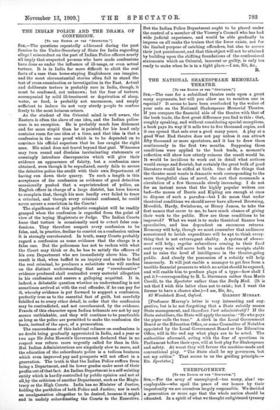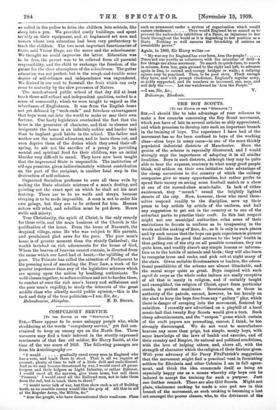UNEMPLOYMENT.
[To ma EDITOR OF TIIR "srserAroz.1
Sin,—For the army of unemployed—too many, alas ! un- employable—who spoil the peace of our homes by their importunity we are ourselves largely responsible. We decided a generation or more ago that the whole nation should be educated. In a spirit of what we thought enlightened tyranny
we called in the police to drive the children into schools, like sheep into a pen. We provided costly buildings, and spent lavEshly on their equipment, and at haphazard set men and women whose own education had been very perfunctory to teach the children. The two most important functionaries of Elate, said Victor Hugo, are the nurse and the schoolmaster. We thought we could improvise the latter. Education was to be free, the parent was to be relieved from all parental responsibility, and the child to exchange the freedom of the gutter for the close atmosphere of the schoolroom. The gutter education was not perfect, but in the rough-and-tumble some degree of self-reliance and independence was engendered. We desired in our zeal to forestall the fruit which can only come to maturity by the slow processes of Nature.
The much-abused public school of that day did at least teach those self-reliant and independent qualities, united to a sense of community, which we were taught to regard as the inheritance of Englishmen. It was from the English home not yet debased by " week-ends " and frivolous extravagance that boys went out into the world to make or mar their own fortune. Our hasty legislators overlooked the fact that the home is the generator of character, and that to cleanse and invigorate the home is an infinitely nobler and harder task than to implant good habits in the school. The father and mother are the natural educators, and to leave them out, and even deprive them of the duties which they owed their off- spring, to ask not the sacrifice of a penny in providing mental and spiritual food for their children, was an initial blunder very difficult to mend. They have now been taught that the impersonal State is responsible. The institution of old-ags pensions, given indiscriminately without contribution on the part of the recipient, is another fatal step in the destruction of self-reliance.
Organised Socialism professes to cure all these evils by making the State absolute mistress of a man's destiny, and pointing out the exact spot on which he shall set his next footstep. There are to be no waifs and strays, because straying is to be made impossible. A man is not to order his own goings, but they are to be ordered for him. Human nature will• rebel, and rebellion must be put down. Hence strife and misery.
True Christianity, the spirit of Christ, is the only remedy for these evils, and the main business of the Church is the purification of the home. From the home of Nazareth, the despised village, came He who was subject to His parents, and proclaimed glad news for the poor. The poor man's home is of greater moment than the stately Cathedral ; the wealth lavished on rich adornments for the house of God, Whom the heaven of heavens cannot contain, is diverted from the cause which our Lord had at heart,—the uplifting of the poor. The Primate has called the attention of Parliament to the pressing need of amending the Poor Law, a work of far greater importance than any of the legislative schemes which are sprung upon the nation by headlong enthusiasts. To weld classes together, to soften outlines and not to harden them, to combat at once the rich man's luxury and selfishness and the poor man's cupidity, to study the interests of the great middle class who silently mould public opinion,—this is the task and duty of the true politician.—I am, Sir, &c.,















































 Previous page
Previous page